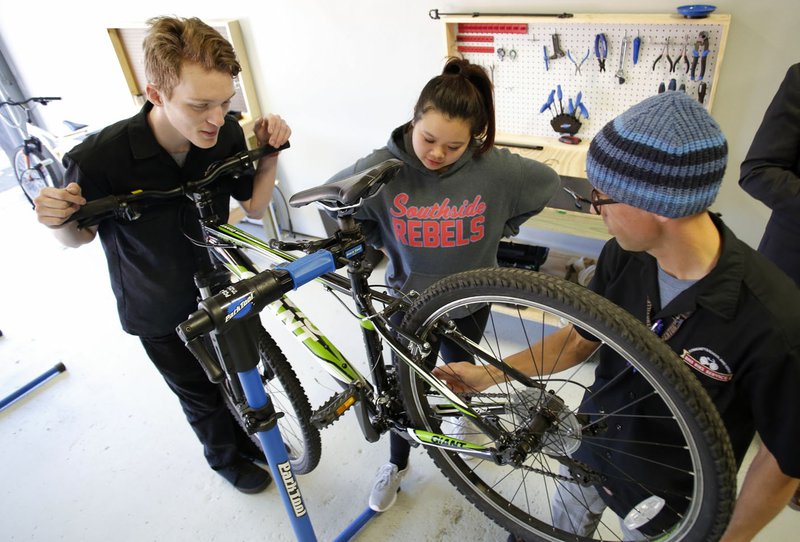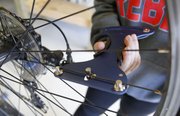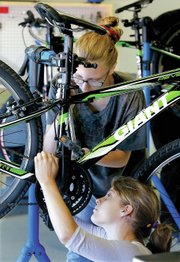Bicycle lessons in physical education classes mean school districts now have hundreds of bicycles to maintain and repair.
The Bentonville and Fayetteville school districts established elective courses within their alternative programs involving students keeping the bicycles in riding condition. Instructors see potential for not only maintaining bicycles for their districts, but also for assisting community organizations.
Alternative learning environments
• Alternative education is a nontraditional approach designed to support students in achieving academic, social and emotional success. Programs are approved by the state.
• Gateway Alternative Learning Environment: Bentonville School District program for students in ninth through 12th grade.
• Agee Lierly Life Preparation Services Center: A school of innovation and alternative education program for Fayetteville School District students in ninth through 12th grade.
Source: Staff report
Heidi Stirzinger, 18, didn't know the parts of a bicycle before taking the bicycle shop class offered through Bentonville School District's Gateway Alternative Learning Environment. She wasn't sure about the course at first but needed an elective to meet graduation requirements, she said. Gateway is Bentonville's alternative learning program.
It took a couple of months, but Stirzinger said she learned about every piece of a bicycle. She also learned about the tools used in the repair process.
She now knows what to do if her little brother's bicycle breaks down at home.
"I'm pretty proud of myself," Stirzinger said. "I can fix a bicycle."
Tina VanDine, 17, learned how to repair disc brakes and brake pads on bicycles through Fayetteville's bicycle education class. She gained a better understanding of derailleur systems that are involved in shifting gears.
A checklist guides students through inspecting different parts of bicycles: tire treads, wheel spokes, hand brakes and seats. When students finish, they take the bicycles for a three-minute test drive.
VanDine finished the class in the first quarter of the school year at the Agee Lierly Life Preparation Services Center, an alternative education program and school of innovation in the Fayetteville School District. She will graduate in December and plans to continue her education at Northwest Arkansas Community College or Northwest Technical Institute.
She is interested in careers related to mechanical engineering and cars, and bicycle education was the only class offering some exposure to mechanics at her school, VanDine said.
VanDine said she would love Agee Lierly students to have more options for gaining experience that provide an entry point into a career.
"I think that's a great start," she said.
Students in the alternative program can participate in all courses offered at Fayetteville High School, but some students are not able to take some electives because they do not meet prerequisites or program requirements, Principal Denise Hoy said. Most students only participate in sports programs during the last period of the day at Fayetteville High School because of differences in the schedules between Agee Lierly and the high school and because of having to arrange for transportation for classes offered before 2:15 p.m.
Bikes in schools
Fayetteville has had bicycles in schools for about six years in some elementary schools, but the program grew to around 500 bicycles three years ago with grants, said Holly Johnson, district spokeswoman.
The fleet provided a set of bicycles for every school to use for physical education classes from third grade through high school, Johnson said. The district now has a mountain bike team.
Hoy asked longtime Agee Lierly teacher Leverett Archer if he was interested in teaching the bicycle repair class. Archer primarily teaches credit recovery classes, but he went through a training program last summer about repairing bicycles and instructing students in the process.
The program began this fall. Archer was starting the program from scratch, and he began reaching out to organizations within the growing Northwest Arkansas cycling community.
Archer's networking efforts led him to Jason Swim, who oversees the bicycle shop class at Gateway. Swim offered Archer encouragement and on Tuesday brought his students to help Archer's students work on bicycles. Students said the meeting was a little awkward at first, but they spent lunch together eating pizza.
Swim structured his program to train students to be professional technicians. They wear mechanic shirts and carry business cards. Bicycle repair started as the Bentonville School District built up a grant-funded program that provided 600 bicycles distributed among the campuses.
Bicycle programs also exist in some Rogers schools and in the Springdale School District.
At one point, the Bentonville School District had a backlog of bicycles needing repair, Swim said. Through some trial and error, Swim developed a process for streamlining repairs. Swim said he was excited to hear about Fayetteville's program and offered to help.
Archer also wanted Swim's input on tools and supplies that are useful in a bicycle repair shop.
Growing education
Students in Fayetteville's class learn skills they can apply to their personal and work lives, including how to read a manual and follow step-by-step instructions, Archer said. He assigns two students to a bicycle so they learn teamwork.
As Archer learns more, he hopes to grow the program and is interested in paying some student interns to work in the bicycle repair shop, he said.
Swim and Archer also are interested in expanding their programs to help charities, such as Pedal It Forward NWA, an organization that accepts donations of old bicycles, repairs them, and gives them to veterans, homeless shelters and families in need.
Pedal It Forward NWA started two years ago with a motto of, "Everybody needs a bike," said Steve Marquess, a volunteer with the group. The group has provided hundreds of bicycles and helmets to families and veterans in Northwest Arkansas, as well as to nearby communities in Oklahoma and Missouri.
The all-volunteer organization has a core group of about eight people who have been assisted by a couple dozen other individuals, Marquess said. The nonprofit organization has a workshop with five stands where people gather on Monday nights and Saturday mornings to repair bicycles.
If other groups want to work on bicycle projects, Pedal It Forward can provide space and bicycles, Marquess said. He also sees a need for people who have received bicycles to have a place they can take their bicycles for repair. He's interested in working with the bicycle shop teachers and their students, he said.
When Archer began working at the campus now housing the Agee Lierly program, what was known as the Fayetteville High School West Campus offered vocational and technical programs that gave students opportunities to learn by doing and by working with their hands. That focus changed in 2005, Archer said.
Programs in construction trades, culinary arts, auto mechanics and child care no longer are offered at the Agee Lierly campus, Archer said. Opening a bicycle repair shop on the campus gives students a class that is different from sitting in a chair, reading chapters in a textbook and answering questions, he said.
"I was happy to realize there's a shop class back on the West Campus again," Archer said.
NW News on 11/21/2016


